Text
Msgs may be autodialed. Consent to texts not required to purchase our svcs. Msg. and data rates may apply.
Sink Installation Services
Over 25 Years of Experience
Dekton-Certified Fabricator
Work Guaranteed
Hours:
Sink Design and Installation in Albuquerque
Whether you want to completely remodel your office bathroom with stainless steel or you simply want to add a new stone sink to your kitchen, Padilla Granite is here to help. We specialize in sink design and installation services that will leave your space looking better than ever.
If you're considering installing a new sink during your next remodeling or home improvement project, contact Padilla Granite. We can help you figure out the best options for you based on your stylistic wants and functionality needs.
Request a call back from us today to get started!
Sink Material Options and Their Pros and Cons
Stainless Steel
Stainless steel is an ultra-hygienic sink option that helps prevent contamination during food preparation and washing your dishes. It is highly heat- and stain-resistant and extremely easy to keep clean. It is the choice for industrial applications, as well as industrial design. Pay attention to the gauge (or thickness) of the steel of your new sink. The smaller the gauge, the thicker the steel. The most appropriate thicknesses are between 16- and 18-gauge steel, as these are tough, strong, and unlikely to buckle or bend under heavy use.
- Pros: Affordable; easy to clean and maintain
- Cons: Can be noisy due to the industrial finish; shows water spots without attention
Stainless steel sinks require little maintenance other than regular cleanings, which simply involve washing with a soft cloth and gentle soap and rinsing with warm water. Deeper cleaning can be achieved by sprinkling your sink with baking soda and scrubbing with a gentle cloth.
Enameled Cast Iron
This option is one of the heaviest, yet most durable, materials for sinks. Reinforcing cabinets may be needed to keep them from buckling or warping under the weight of your sink, especially when it’s filled with dishes and water. Enameled cast iron sinks are made with a non-porous enamel coating that is fused to the iron with extremely high heat. The coatings are available in a wide variety of colors and finishes to match your sink to nearly any decor.
- Pros: Highly durable and long-lasting; versatile styles and colors
- Cons: Heavy; can chip with sharp and heavy materials
Though non-porous and stain-resistant, harsh chemical and abrasive cleaners can stain the enamel coating on cast iron. Regularly clean your sink with mild cleaners or detergents to prevent stains.
Enameled Steel
Enameled steel uses the classic look of enameled cast iron at a lower price tag to give your sink the quality and impact to meet your needs. It utilizes a steel frame covered in durable, non-porous enamel. The material is easy to clean, resistant to stains and scratches, and fits a variety of kitchen styles. Enameled steel is lighter than cast iron, so it's likely that you will not need to add cabinet reinforcements, which will cut down the cost of updating your kitchen. Alternatively, enameled steel is not as durable as enameled cast iron. It's thinner and more prone to chipping and cracking than cast iron, which may lead to rust if water penetrates the surface of the enamel. Regardless, enameled steel remains a quality choice because of its affordability and long-lasting finish.
- Pros: Affordable; easy to clean
- Cons: Susceptible to dents, chips, and rust
You can clean your enameled steel sink with gentle soap and water regularly, but abrasive cleaners and chemicals can damage the surface of the enamel and penetrate the enamel.
Quartz Composite
A man-made material, quartz uses a mixture of natural stone and acrylic resin and coloration to create the look and feel of natural stone. Quartz composite resists staining because of its nonporous properties and uniformity due to its composition. These properties help increase resistance to chips and scratches. The hard surface of quartz composite offers increased durability, and the temper of the material creates the possibility of delicate dishes and glasses breaking if dropped in the sink. Quartz composite is still a popular material for sinks because of its heat resistance, absorption of sound, and availability in a variety of styles. Quartz composites are more affordable than natural stone.
- Pros: Extremely durable; heat- and sound-resistant
- Cons: Dishes and glassware can break if dropped in the sink
To keep your quartz composite sink in the best shape, it's important to keep it clean by wiping your sink down regularly with water and mild soap.
Granite Composite
Granite composite is a mixture of natural granite and acrylic. The combination creates one of the strongest sink materials available. Easy to clean, granite composite is resistant to heat, scratches, chips, and stains, which allows the sink to have a long lifetime of use. Unlike metal and ceramic sinks, granite composite dampens sound, reducing the noise of pots and pans dropping against the sink. Like enameled cast iron sinks, granite composite sinks are very heavy and may require cabinet reinforcements. With durable features plus a smooth matte finish available in multiple colors, granite composite sinks are extremely popular.
- Pros: Easy to clean and maintain; resistant to heat, scratches, chips, and staining
- Cons: Heavy; may require cabinet reinforcements to support the weight
Wiping down your sink regularly with mild soap and water should keep it clean. Tough stains can be cleaned with a mixture of water and baking soda applied to your sink. Adding vinegar and wiping with a non-abrasive sponge then rinsing with warm water should return the finish of your finish.
Fireclay
Fireclay is clay shaped and fired at high temperatures, forging a durable and hard material. Fireclay resists stains, scratches, and high temperatures, while also being resistant to rust and fading. Fireclay can crack if heavy or sharp objects are dropped in the sink. Cracked fireclay sinks cannot be repaired and have to be replaced.
- Pros: Resistant to stains, scratches, rust, fading, and high temperatures
- Cons: Can crack from dropped objects; chips and cracks are not able to be repaired
Using a soft sponge to gently scrub your sink with dish soap and rinse with warm water is sufficient for daily cleaning. Dry your sink often after use to prevent hard water build-up. Avoid harsh or abrasive chemicals because they can strip the glaze from the fireclay and make the material susceptible to damage. Tough stains can be cleaned by a spray with an 80/20 water to vinegar solution and let it sit for five minutes before scrubbing and rinsing clean with clean water.
Porcelain
Porcelain is made by firing two ingredients at extremely high temperatures. Typically these materials are potter stone and kaolin, a silicate mineral that creates structure. The combination results in an extremely dense and hard ceramic material with a smooth, nonporous finish. Porcelain comes in a variety of colors, although white is the long-standing favorite thanks to its timeless appeal.
- Pros: Easy to clean and maintain; stain-, heat-, and scratch-resistant
- Cons: Can be chipped by heavy objects dropped onto the surface
Porcelain can be cleaned with nearly any type of cleaner. Regularly rinse your sink with mild soap and water to avoid spots from dried-on food. To remove hard water buildup, use ammonia-based cleaners or bleach.
Vitreous China
Vitreous china is an enamel-like finish typically applied over traditional porcelain to make it stronger, shinier, and more resistant to scratches, chips, and stains. Typically, vitreous china is more durable and less expensive than porcelain, making it a popular choice in commercial bathrooms and other high-use areas. Vitreous china is usually easier to install than traditional porcelain due to it being lighter than steel and cast iron enameled with porcelain.
- Pros: Affordable; easy to clean and maintain
- Cons: Less versatile in style
Warm water and mild soap should keep vitreous china clean and shiny. Avoid abrasive chemicals by using cleaners specifically created for sinks.
Stone
Stone sinks are incredibly resilient to heat, scratches, and dents. Because they are stone material, they tend to be porous and need to be sealed to prevent them from absorbing liquids and becoming stained or discolored. They are also extremely heavy, requiring cabinet reinforcements before installation. Natural stone sinks are some of the most expensive sinks available because of the manufacturing processes and installation supports needed.
- Pros: Heat-resistant; long lifespan; adds value to your home
- Cons: Very heavy; extra reinforcement needed; proper sealing required
Stone sinks are very susceptible to hard water build-up from the natural porosity of the stone. Because of this, the materials need to be sealed, which means you should always dry your sink after each use. Mild soap and water are best for general cleaning. We recommend that you avoid using acidic cleaners, including vinegar and lemon-based cleaners, because they can eat away the sealant, scratch the stone, and cause irreparable damage.
Sink Options Perfect for Any Style
We have over 25 years of experience.
serving Area
Albuquerque, NM
and surrounding areas
Business Hours
- Mon - Fri
- -
- Sat - Sun
- Closed
Sat - Sun by Appointment
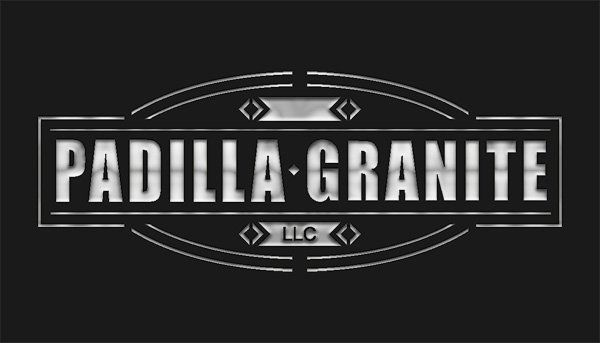
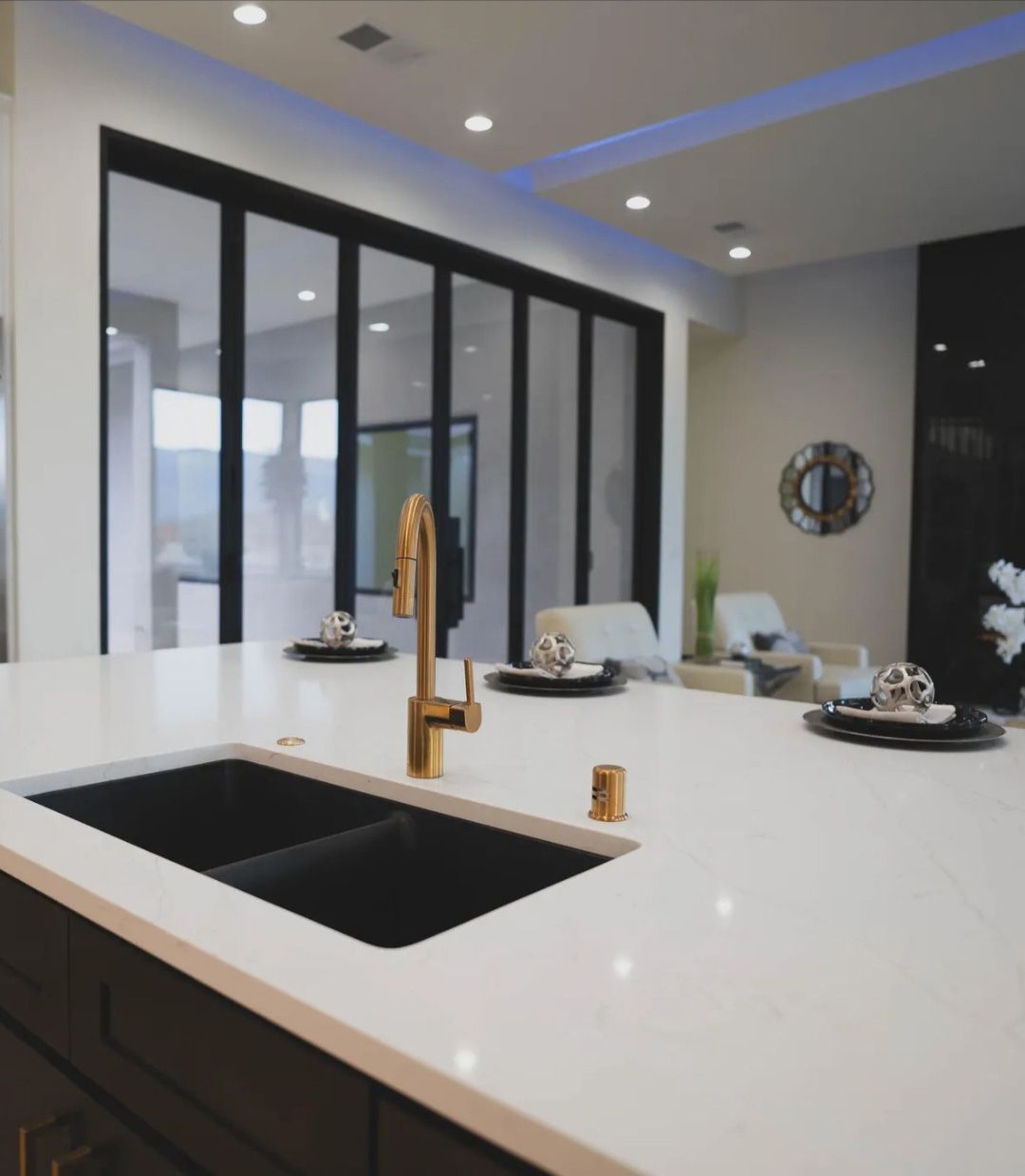
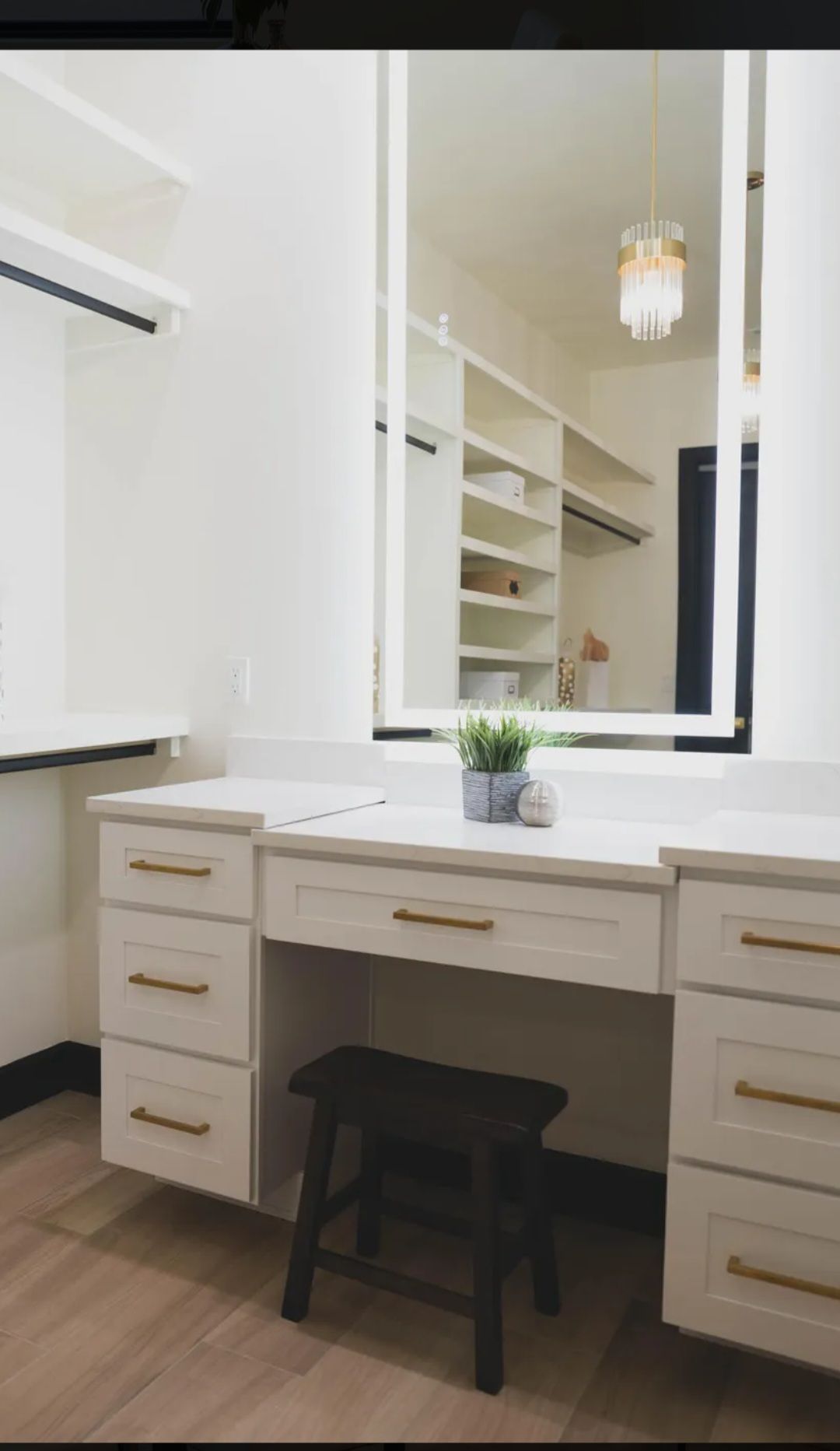
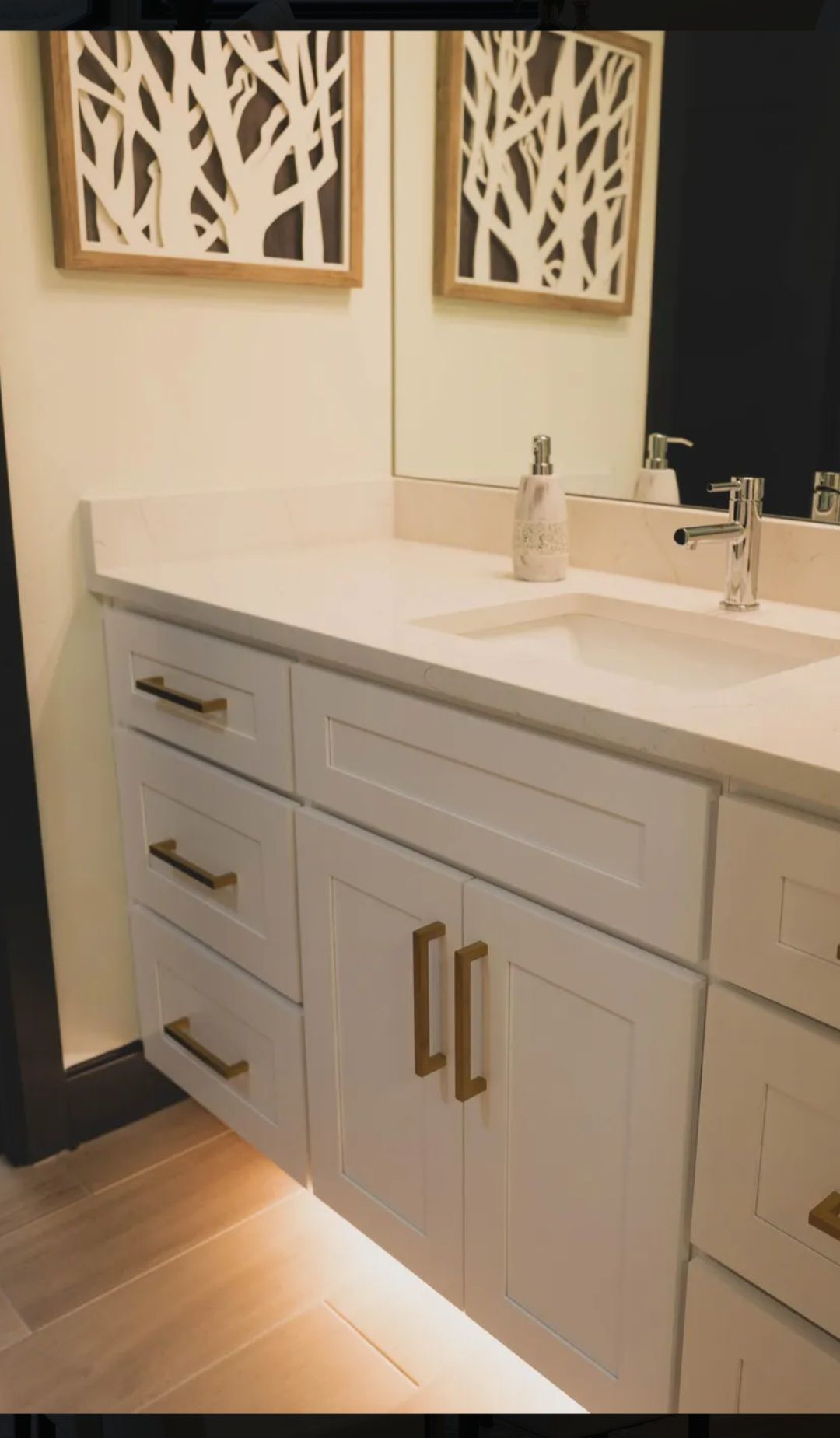
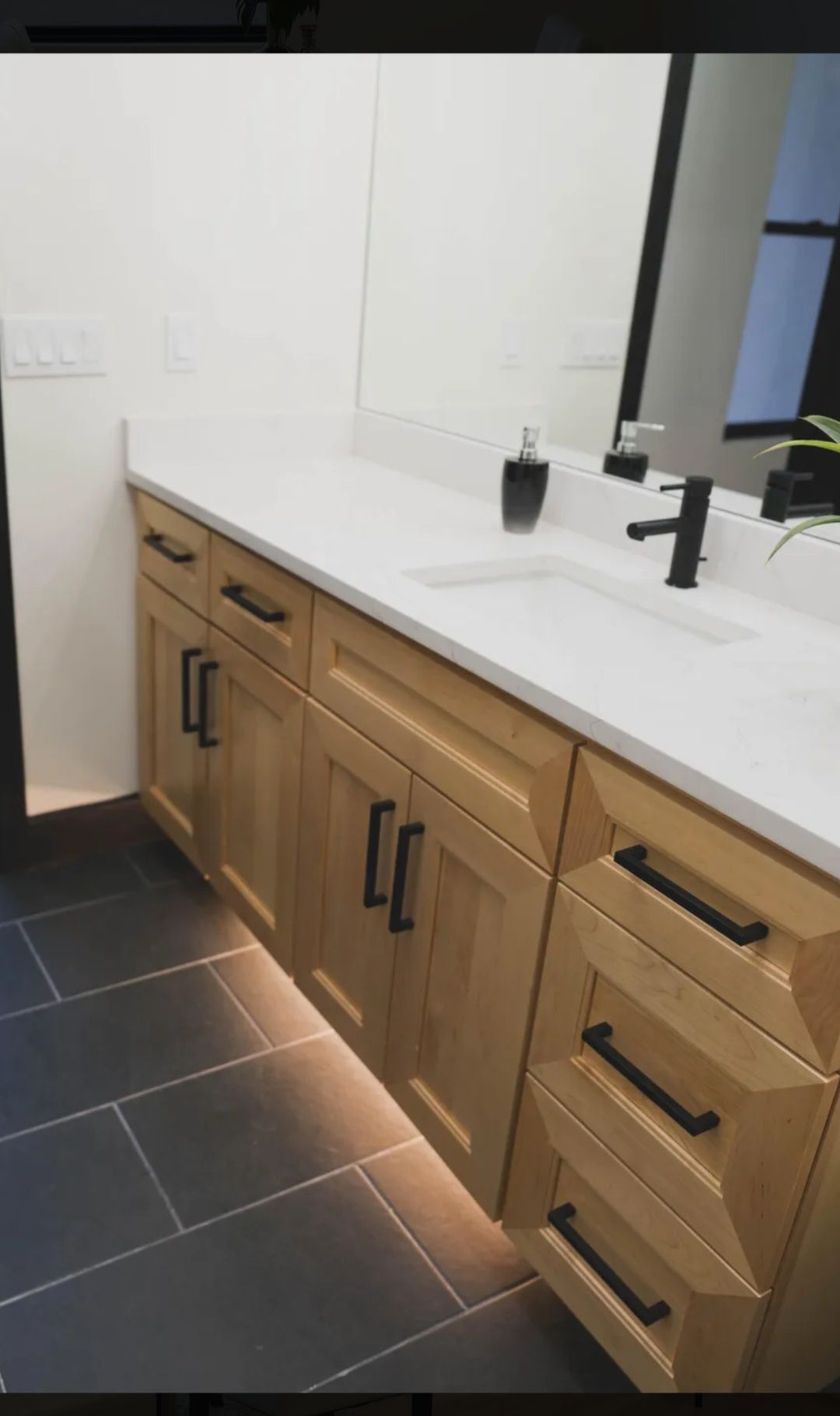

Share On: